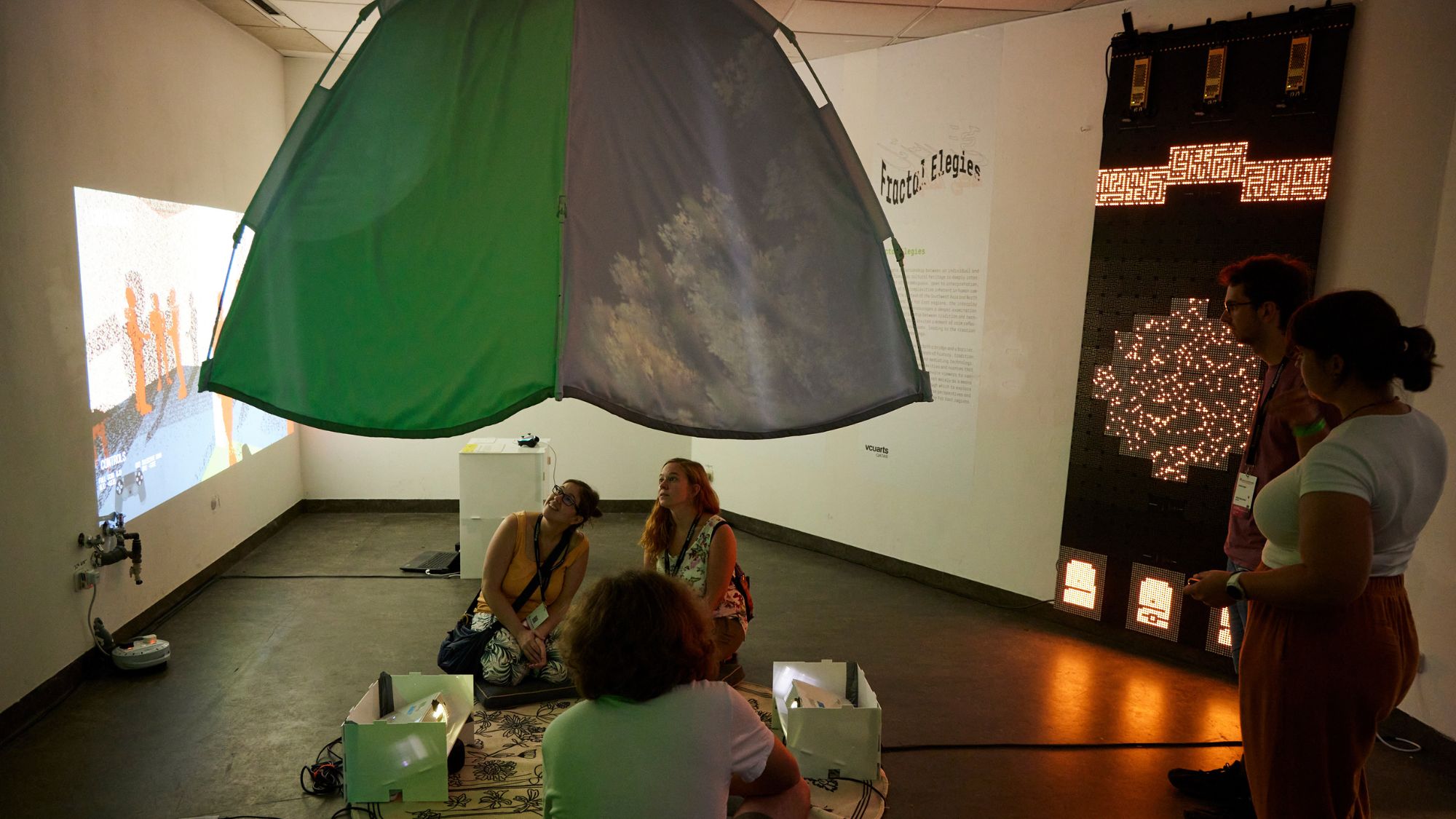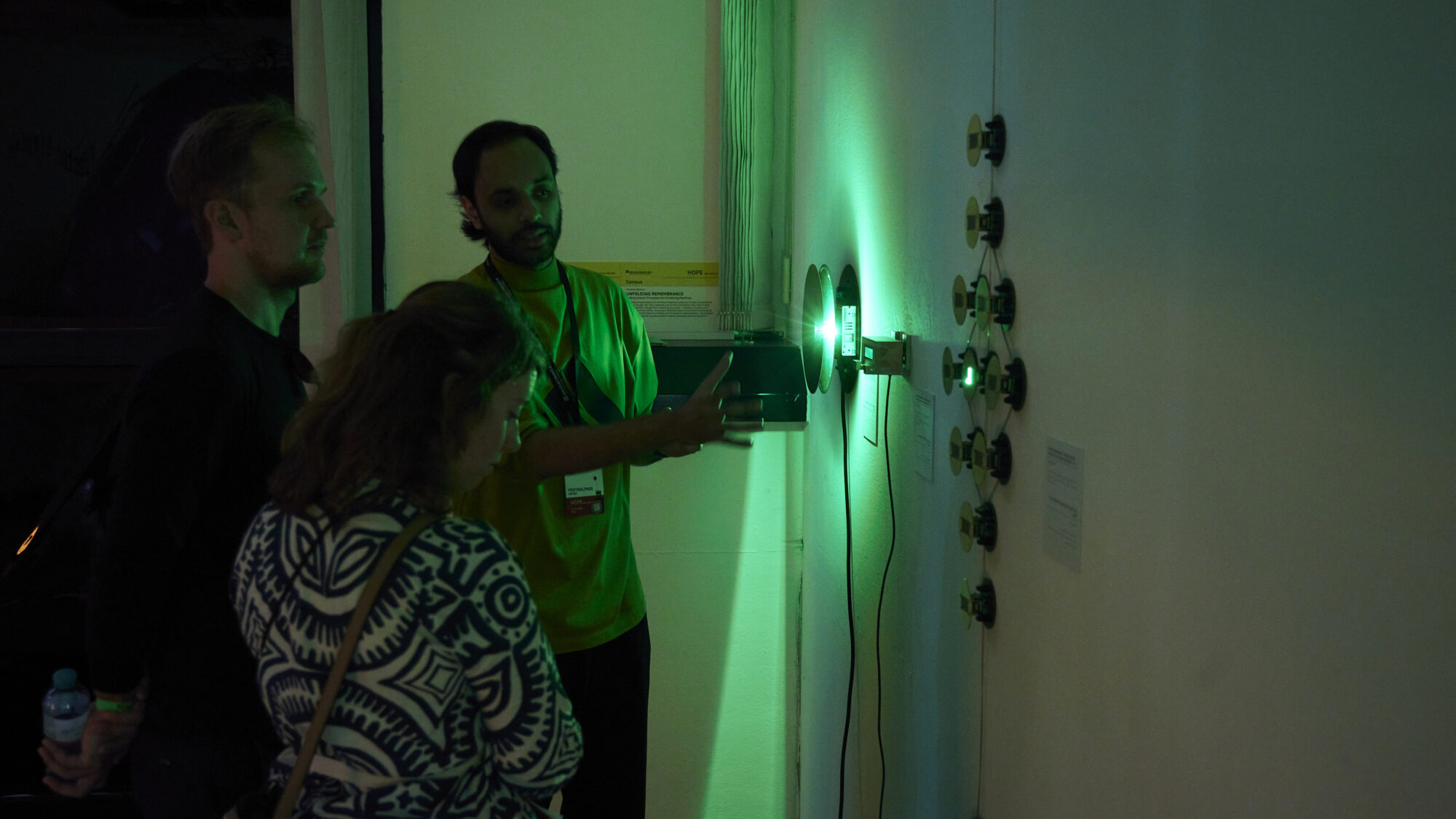- Academics
- Admissions & Enrollment Services
- Research
- Academic & Creative Spaces
- Strategic Partnerships
- Our Impact
- Student Affairs
- Campus & Community
VCUarts Qatar at the 2025 London Design Biennale - June 5–29, 2025
VCUarts Qatar Takes Part in Ars Electronica Festival 2024
September 9, 2024

VCUarts Qatar exhibition used new media and technology to explore the diverse perspectives and experiences of various cultures in the SWANA and Far East regions.
Virginia Commonwealth University School of the Arts in Qatar (VCUarts Qatar), a Qatar Foundation partner university, participated in the Ars Electronica Festival held in Linz, Austria, from September 4-8, 2024. It was the second time that faculty, alumni and students from the art and design University were participating in the world-renowned festival that drew more than 80,000 visitors in 2023.
This year, VCUarts Qatar’s exhibition was titled ‘Fractal Elegies’. Fractal Elegies invites viewers to engage with language not merely as a means of communication but as a lens through which to explore conceptions of meaning within diverse perspectives and experiences rooted in Southwest Asia and North Africa (SWANA) and Far East regions.
The Ars Electronica Festival 2024’s theme was ‘Hope – who will turn the tide?’. As per the festival’s official website, “the festival’s goal is to spotlight as many people as possible who have already set out on their journey and whose activities—no matter how big or small—are a very concrete reason to have hope”.
The VCUarts Qatar designers were Rogsh Emmanuel H. Garcia, Hind Al Saad, Basma Hamdy, Levi Hammett, Shima Aeinehdar, Selma Fejzullaj, Nada Abdo, Ayza Sheikh, Syed Naqvi and Erika Tsuchiya. The designers used a range of electronic accessories and technology such as lidar scanners, LED bulbs and 3D software including Blender and Unity to bring their creative concepts to life.
Rogsh Emmanuel H. Garcia’s installation titled ‘Luminance: A Narrative Lidar Experience’ offered an immersive game that invites players to explore the narratives of expatriate Filipino culture while Hind Al Saad’s ‘Unfolding Remembrance: Folding Islamic Principles into Pondering Machines’ explored the links between Islamic art and computational art.
‘Wujood’, created by Basma Hamdy, Levi Hammett, Shima Aeinehdar and Selma Fejzullaj, was an animated tapestry illuminated by thousands of LED bulbs, serving as a visual ode to the rooted nature of the Arabic language. ‘Queen of the Mountains’, an installation designed by Nada Abdo, Ayza Sheikh, Syed Naqvi and Erika Tsuchiya, drew inspiration from a poem by Qatari poet Saoud Al-Kuwari.

Rogsh Emmanuel H. Garcia with his installation titled ‘Luminance: A Narrative Lidar Experience’

Hind Al Saad’s ‘Unfolding Remembrance: Folding Islamic Principles into Pondering Machines’

‘Wujood’, created by Basma Hamdy (pictured), Levi Hammett, Shima Aeinehdar and Selma Fejzullaj

‘Queen of the Mountains’, an installation designed by Nada Abdo, Ayza Sheikh, Syed Naqvi and Erika Tsuchiya
Garcia, who graduated with a BFA in Graphic Design in 2024, shared his experience.
He said, “The ability to learn from other designers is always an experience creatives such as myself must have. Hence, being part of Ars Electronica was indeed an exciting milestone for me as I got to exhibit and share my work with other designers and, in turn, be inspired by them. Additionally, the opportunity to represent the Filipino community and its designers and tell their stories had a big impact on my community as it was a way for visitors from other parts of the world to appreciate and relate to the history and heritage of the Philippines.”
Since being set up in 1979, Ars Electronica has evolved to be a world-renowned platform that brings artists, scientists, technologists, designers, developers, entrepreneurs and activists from all over the world together, giving participants a chance to discuss how new technologies can change the way people live and work together. It is an opportunity for participants, such as VCUarts Qatar’s faculty, alumni and students, and visitors alike to see how machine learning, virtual reality, robotics or biotech can contribute to socially and ecologically sustainable progress.

